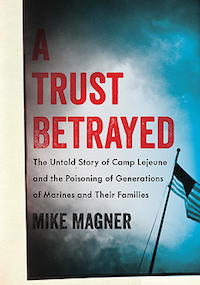By Benjamin Franklin Martin
Mike Magner concludes his excoriating account with this indictment: “The Camp Lejeune contamination constitutes the largest and worst incidence of a poisoned water supply in history. Had a corporation been responsible, there would almost certainly have been a massive criminal complaint filed by the federal government.” Semper Fidelis—“Always Faithful”—is the motto of the United States Marine Corps. On this issue, and over decades, not years, the conduct of high-ranking Marine officers made mock of that pledge.
In 1941, the Marine Corps established their east coast base of operations in the sandy, swampy soil of coastal southeast North Carolina and the following year named it after one of their greatest leaders. The location was ideal for training in amphibious warfare but lacked adequate potable water. Because the local New River and its tributaries were too brackish for use, the base had to tap a shallow aquifer. The danger of pollutants was then generally unrecognized, and careless disposal of chemicals, solvents, and organic refuse inevitably contaminated the freshwater supply.
Although Congress established the Environmental Protection Agency in 1970 and enacted the Safe Drinking Water Act in 1974, only the scandal of toxic waste at Love Canal in 1978 led the Pentagon to test for pollution at its installations. The results from freshwater wells at Camp Lejeune in 1980 and 1981 revealed elevated levels of “chlorinated organic materials,” especially of trichloroethylene (TCE), 1,400 parts per billion, and tetrachloroethylene (PCE), 104 parts per billion—the acceptable level for each is now known to be 5 parts per billion.
By 1982, officials at Camp Lejeune had more than enough information to act. Their decision was to reduce the frequency of testing and to claim that contamination levels were “low.” They did not shut down a single well until 1984. The base assistant chief of staff for facilities made clear the priorities of the Marine Corps: “the potential health hazards must be weighed against the need and cost of providing water from other sources.” Four years later when the Environmental Protection Agency proposed placing Camp Lejeune on its Superfund list, estimating that the cleanup would take thirty years, Marine engineers contended that five years would suffice.
From then on, the Marine Corps resisted turning over relevant documents and opposed reviews of health problems suffered by the Marines and their families assigned to Camp Lejeune. But by the early 2000s these men and women were organizing as THE STAND (Toxic Homefront Empowered Survivors Take All Necessary Defense). They gained powerful allies in a series of North Carolina Senators, first Elizabeth Dole, then Kay Hagan, and Richard Burr. They had compelling evidence from a study in 2002: of 12,598 babies born on the base between 1968 and 1985, 1 in 122 suffered from either a horrific birth defect or deadly childhood cancer—for neural tube defects, 265 percent above normal, for cancers, 15.7 percent higher. More evidence came from the revelation that 85 former Marines who had served at Camp Lejeune suffered from rare male breast cancer.
Congress finally took notice, and in July 2012, over the opposition of both the Pentagon and the Veterans Administration, passed a bill providing medical care to the victims of contamination at Camp Lejeune. Even so, the Veterans Administration will delay complete coverage until it has “rules in place,” perhaps as late as 2015.
Magner supplements this recital of shabby military and administrative deceit with heart-rending stories of the victims. He writes with controlled anger at this “trust betrayed.” Senator Dole caught its essence when she said sadly: “Denying what happened at Camp Lejeune is a blemish on the Corps’ unmatched reputation. . . . It appears that no one in a position of leadership took any meaningful action.”
Benjamin Franklin Martin (ΦΒΚ, Davidson College, 1969) is the Price Professor of History at Louisiana State University and a resident member of the Beta of Louisiana Chapter of Phi Beta Kappa.




